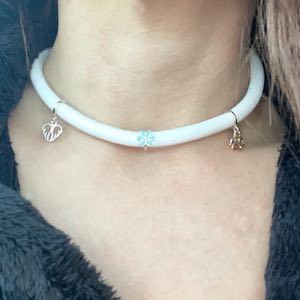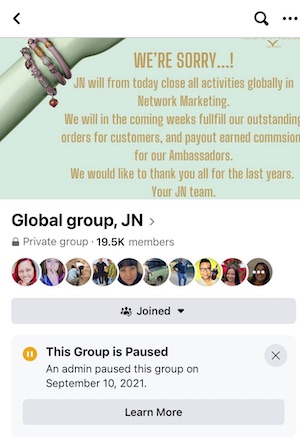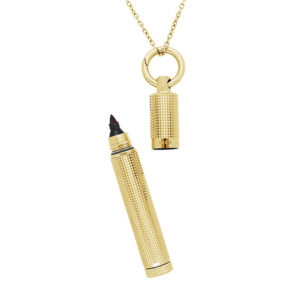
As a stay-at-home mom with two children, Mary Francese had spent the last four years doing multilevel marketing (MLM) for a variety of products. And while she was always bombarded with Facebook ads for MLM schemes, a February pitch for a jewelry brand caught her eye.
“Usually very little stands out to me,” she says. “But with COVID, the kitchenware brand I was working with had a lot of supply backups. And when I saw this post, it talked about jewelry, it talked about how it involved the co-founder of Pandora. I thought, it would be stupid not to pursue this. Pandora was a really successful company. The product, the compensation plan, it all seemed perfect.”
And for a while, she says, it was. She spent nearly seven months selling Jesper Nielsen (JN) jewelry, eventually becoming a company World Leader and joining its customer service team. But last week, JN abruptly stopped its network marketing, leaving many bitter employees and salespeople in its wake.
The company was started by, and named after, Jesper Nielsen, co-founder of Pandora’s Central and Western Europe division. He later wrote a book about his time building the brand, and it became his calling card, so much so that the company once sued him over his use of its name.
His follow-up project, charm brand Endless, saw a quick rise then an equally quick fall. His next business, Amazing Jewelry, meant to be the “H&M of jewelry,” ended up filing for bankruptcy.
Then, last year, he tried another tack—MLM, or, as it’s now called, network marketing.
“We have further developed on our Amazing concept,” he wrote last year on LinkedIn. “[W]e are now also launching the jewelry brand ‘Jesper Nielsen’ ambassador concept in Denmark.”
The brand started in Germany before expanding to Austria and the United Kingdom. In April, it came to America, run by Las Vegas-based entity Coni2.
The company eventually recruited a fleet of over 70,000 salespeople, called “ambassadors.” JCK talked to a few, and they all genuinely enjoyed the experience: The jewelry was nice, affordably priced, and hit the market at the best possible moment. With COVID-19 keeping everyone home, online shopping was huge. “It was almost like a fairy tale,” says one.
The Pandora connection was a plus, adds Francese: “That made it stand out to everybody, because Pandora is so popular and our charms would fit into theirs, and theirs would fill into ours.
“At first, it was great. I was completely passionate about it. From the first post, people were interested. I had people on my selling team from New Zealand, Australia, and South Africa. This would have been a really powerful company if it was done right.”
But the quick growth became a problem, she says. Orders got delayed. So did commissions. And the company kept expanding into new markets.
“With a new company like this, you are always going to run into problems,” Francese says. “We figured it was because they underestimated the growth, but they kept wanting to expand, expand, expand.”
Still, Francese’s sales were so good that in June, she won a car—though she never got it, she says. She took a salaried part-time position as a customer service representative, but the complaints quickly overwhelmed her.
“People kept saying, ‘I want a refund. I want a refund.’ It wasn’t like just one person. It was a whole pile of orders. It was overwhelming. All these people deserved answers, and they were angry.”
In the summer, the company ran a string of “70% off” sales. “It didn’t make sense,” Francese says. “That’s the kind of thing you do in the beginning.”
Then, on Sept. 10, everything came to a crashing halt. On an internal Facebook group, the company posted that “JN will from today close all activities globally in Network Marketing.” Its website went offline. Nielsen took down his Facebook page and has not responded to messages, including from JCK.
Employees say the announcement totally blindsided them.
“When I woke up, there was tons of messages,” says Francese, who lost access to her email and order history. “They said ‘JN’s done.’ I said, ‘What? This is how they tell us? With just a message?’”
Lisa Salmons, head administrator of the U.S. division, didn’t know JN was closing until she opened her email on Friday morning; she believes thousands of dollars in orders are still unshipped.

The company’s announcement pledged to “fulfill our outstanding orders for customers, and payout earned commission for our ambassadors.” On social media, however, disgruntled associates fumed about unpaid cash and unfilled sales. One Change.org petition—started by Francese—has garnered 2,200 signatures at press time.
One exec has responded publicly: Søren Colding, the company’s head and Nielsen’s brother-in-law, told Danish newspaper Finans that while some orders may be delayed, “goods are being delivered every day. We have paid our commissions and we continue to pay our commissions.” Colding did not respond to a request for comment.
Former pro soccer star Colding now heads etailsolutions.dk, which some call an outlet for JN inventory. After Finans reported that some Jasper Nielsen inventory may have originated from Amazing, the latter’s bankruptcy trustee, Boris Frederiksen, said he’d examine those transactions.
Salmons has been talking to Danish authorities and hopes that local authorities get involved. Regardless, most ambassadors say they don’t expect to collect any money owed to them. Many have hard feelings. There was even a Facebook “burn session” where ambassadors set fire to JN items.
“This journey for me was absolutely amazing, up until the point where my dreams were ripped away,” said U.K. ambassador Davidson Manalang, another World Leader, on a Facebook Live session.
He said he’s learned a key lesson from this: “Do your research. It’s so easy for people to want to find money to earn and fall in the trap of not knowing what they’re getting into. Please do your due diligence. It’s so important.”
Top: Francese showing off a JN product. (Images courtesy of Mary Francese)
- Subscribe to the JCK News Daily
- Subscribe to the JCK Special Report
- Follow JCK on Instagram: @jckmagazine
- Follow JCK on X: @jckmagazine
- Follow JCK on Facebook: @jckmagazine







